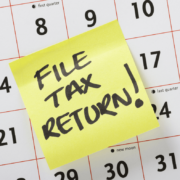Managing Out-of-State Employees: How to Handle Payroll Taxes
- Learn about state income tax withholding for out-of-state workers.
- Find out how income tax rules vary from state to state.
- Find out about reciprocal tax agreements and tax “nexus”.
Before COVID-19, employers could avoid managing payroll taxes for employees working out of state by having everyone work on site. COVID-19 has led many businesses to keep employees out of the office and instead permanently work from home. Do you have employees who live in a different state from where your business is located? Then, this can create additional challenges for you around payroll taxes.
Below, Fiducial has what you should know about managing payroll taxes for employees working out of state.
State Income Tax Withholding
When it comes to tax withholding, payroll primarily follows the rules of the state where the work is performed. If employees who live out of state come to your business for work, payroll would follow the withholding rules for the state where your business is located.
These employees may also owe income tax to their state of residence. Employers often withhold partial amounts for the residence state in addition to the worked-in state. However, in some cases, the employees handle that themselves when they file their personal income tax returns.
There is an exception when two states have a reciprocity agreement. This means that the governments agree that residents only owe income tax to the states where they live, not where they work. If this applies to your workers, you should already be withholding payroll taxes for the state where your employees live.
Without a reciprocity agreement, payroll taxes may need to be withheld in both the state in which work is performed and the residence state. Check with your state Tax or Revenue Department for details.

Income Tax Rules for Working Out of State
Do your employees work from home in a different state for a number of days that exceed the established threshold for that state? Then, the employer must generally recognize the change and begin to submit taxes to the state where the employee is working, not where the business is located.
This threshold varies by state. For instance, in New York, it's 14 days, but in Illinois, it's 30. Other states have an income threshold or a combination of time and income.
Another factor some state governments consider is whether the employee is working from home for their convenience or as a necessity for their job. If it's for the employee's convenience, then tax withholding should be sourced from the state where the business is located. If working from home is a job necessity, then payroll is sourced through the employee's state of residence. But state laws and rules vary considerably on the specifics.
Reciprocal Tax Agreements and Tax “Nexus”
A state establishes a tax obligation when a business has a physical presence within its borders. That is what creates nexus. If a Floridian goes to New York for a temporary job, they must pay income tax in NY for the money they earn there. And if a California company places employees in Texas, the company must follow Texas laws and pay Texas sales tax.
However, these rules may not apply depending on whether the states involved have a reciprocal tax agreement. The following states have reciprocal tax agreements with other states:
- Arizona has reciprocity with California, Indiana, Oregon, and Virginia
- Washington D.C. has reciprocity with all US States. Washington D.C. has the most reciprocity agreements due to the high number of government officials traveling to and from their home states for work.
- Illinois has reciprocity with Iowa, Kentucky, Michigan, and Wisconsin
- Indiana has reciprocity with Kentucky, Michigan, Ohio, Pennsylvania, and Wisconsin
- Iowa has reciprocity with one state, Illinois
- Kentucky has reciprocity with Illinois, Indiana, Michigan, Ohio, Virginia, West Virginia, and Wisconsin – residents of Virginia must commute daily to qualify and residents of Ohio can’t be shareholders of 20% or more in an S chapter corporation
- Maryland has reciprocity for Pennsylvania, Virginia, West Virginia, and Washington D.C. residents
- Michigan has a reciprocal agreement with Illinois, Indiana, Kentucky, Minnesota, Ohio, and Wisconsin
- Minnesota has reciprocity with neighboring states, Michigan and North Dakota
- Montana has reciprocity with North Dakota
- New Jersey has reciprocity with Pennsylvania
- North Dakota has reciprocity with neighbors, Minnesota and Montana
- Ohio has reciprocity with Indiana, Kentucky, Michigan, Pennsylvania, and West Virginia
- Pennsylvania has reciprocity with Indiana, Maryland, New Jersey, Ohio, Virginia, and West Virginia
- Virginia has reciprocity with Kentucky, Maryland, Pennsylvania, West Virginia, and Washington D.C.
- West Virginia has reciprocity with Kentucky, Maryland, Ohio, Pennsylvania, and Virginia
- Wisconsin has reciprocity with Illinois, Indiana, Kentucky, and Michigan
Another related problem deals with tax "nexus.” This is the concept whereby if a business has an established presence in a state, it may be required to pay sales, income, and other business taxes for that state. In some states, having employees working in the state is enough to establish nexus. But, this could lead to further tax compliance requirements for your business.
Compliance with Payroll Taxes
Unless state laws are changed and/or the federal government standardizes the rules, employers need to understand and comply with their regional requirements around managing payroll taxes for employees working out of state. Organizations will also need to understand the possible nexus impact on their business.
Consider speaking with a legal and payroll expert who is on top of the latest state laws. They can help you update your payroll system to manage the new requirements as your employees continue working from home.
Have questions or need additional details related to any of these credits? Call Fiducial at 1-866-FIDUCIAL or make an appointment at one of our office locations to discuss your situation.
Ready to book an appointment now? Click here. Know someone who might need our services? We love referrals!
For more small business COVID-19 resources, visit Fiducial’s Coronavirus Update Center to find information on SBA loans, tax updates, the Paycheck Protection Program, paid sick and family leave, and more.









